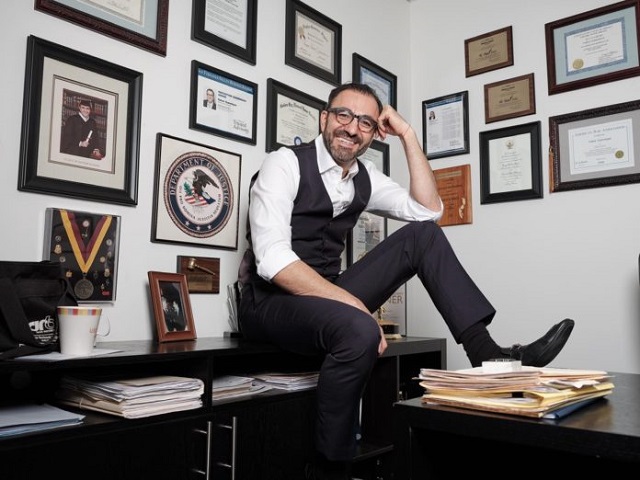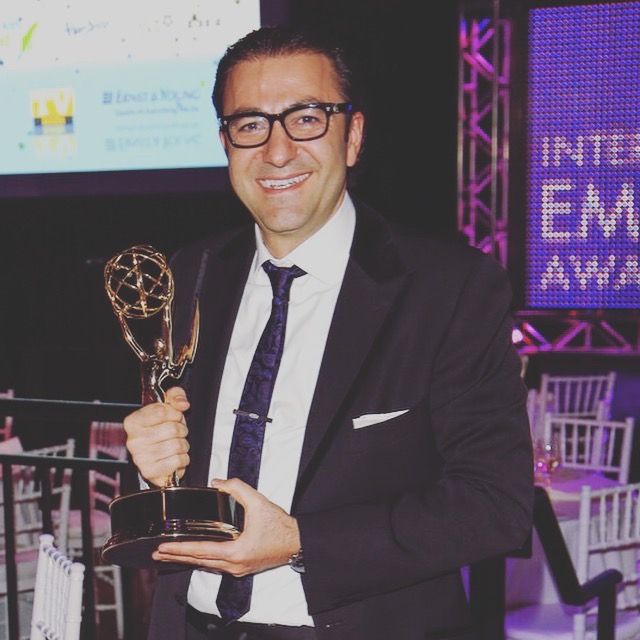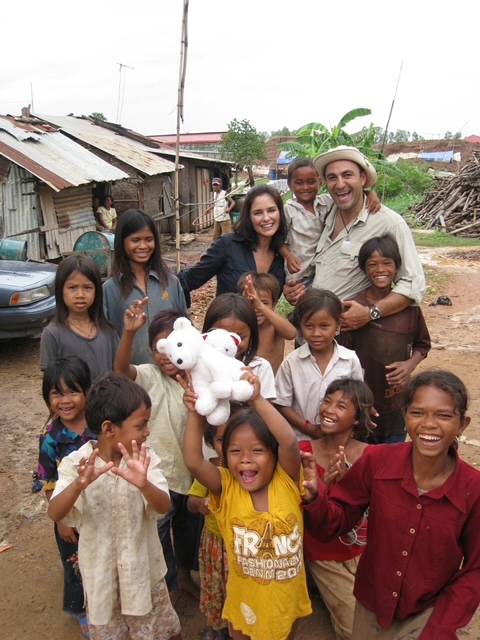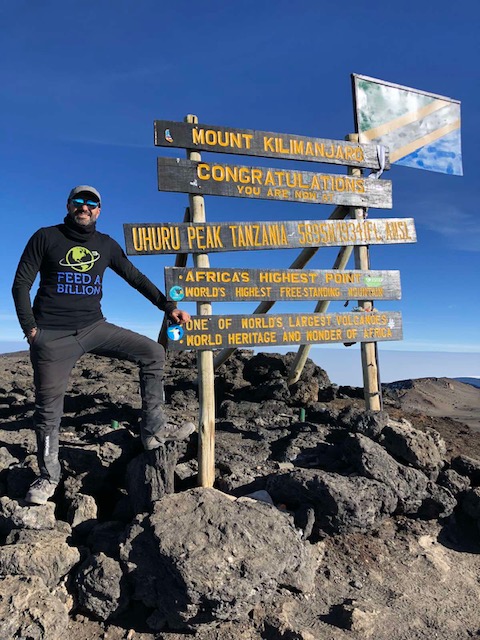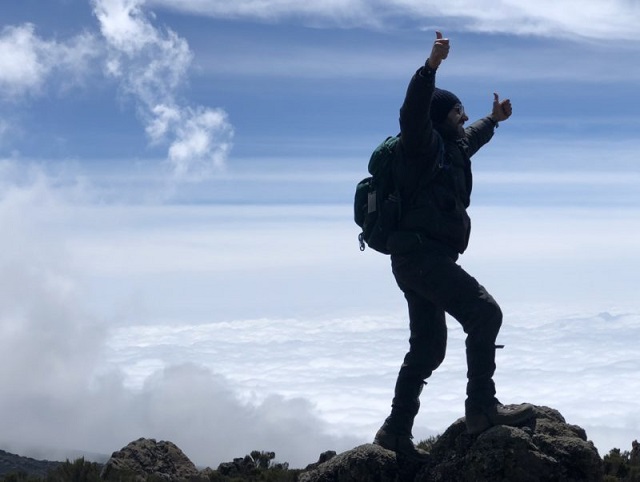Vahan Yepremyan, the co-founder of Ketchup Entertainment, sees the visual arts as a way to deliver important messages, especially now, when because of Covid-19 people are very much isolated and don’t have the possibility to express their feelings and emotions. “That’s one of the values that movies can bring to people: not only to entertain and inspire, but also to make them think, [and] bring awareness about mental health or any other thing. I myself learned a lot from this movie. With mental health comes a lot of stigma and label. But instead of doing that it’s important to understand, to interact with people sometimes with just a simple ‘hello’.”
Vahan founded Ketchup Entertainment about ten years ago as a passion, a creative outlet which brought him an Emmy Award for the film “Lost Christmas,” which was created by partnering with BBC. Vahan successfully incorporates his passion for producing with his primary vocation of attorney, which gives him the opportunity to helps his clients to achieve their goals as entrepreneurs. “People come to me with some idea or concept and I help them put it together and realize whatever vision they have. Or if they come with an existing business or a company and they want to grow it, scale it, license it, I help them get wherever they need to,” he says.
Vahan immigrated to US in 1987 from the Armenian Soviet Socialist Republic and found himself in a new reality somewhat familiar from some movies that were not restricted back in his homeland, but also so different from the one he left behind. “When I was moving – this was the time before internet and YouTube – I really had no idea what life looked like here. It was a cultural shock in the beginning. I didn’t speak any English back then. I ended up going to college to learn English. My parents worked hard. I worked in and off campus, but it was exciting because we were here for a better life, to build something new. There was a lot of adjustment, a lot of learning but also a lot of excitement; for a 17-18-year old. it was a welcomed change,” remembers Vahan.
First, he considered going into art (his mother is an artist and he grew up around the art), then he thought about the movie industry. Later his career search took him to politics, where he worked at the White House think tank Economic Strategy Institute during the presidency of Bill Clinton and subsequently assisted Al Gore’s presidential campaign with fundraising. Finally, he served as a clerk in the US Department of Justice in Washington working on prosecuting major criminal cases in US federal courts.
Even though it seemed like he was on a perfect path to pursue a political career, for Vahan’s creative mind it wasn’t enough. “I got the taste of politics, but one other thing I saw was how the lobbying groups and money play such a big role in politics and how limited the politicians are in making their own decisions, because they need the funding. The world of entrepreneurship seemed more exciting with more opportunities to impact the world and change it from the outside instead of going into the system, being part of it and trying to change it from the inside. I found myself in law school because I realized how important the legal part was for structuring businesses and negotiating contracts. Now, working with different clients from all kinds of industries, I am learning a lot from them,” he says.
“Growing up when I grew up, where entrepreneurship was illegal, I think one of the main reasons that that system collapsed is because there were no entrepreneurial innovations and competition. Everything was anti-entrepreneurial: don’t question authority, don’t speak up, don’t be different, follow the herd, don’t create anything, don’t make money… Everything was state-owned and state-controlled. But entrepreneurs are such an important part of any economy in any country,” Vahan shares his thoughts with certainty.
Entrepreneur Magazine named the law firm he created, Yepremyan Law Firm, one of the Best Entrepreneurial Companies in America for the last three years in a row and Inc. Magazine included Vahan on the list of Greatest Entrepreneurs in America.
There is a dedicated spot in Vahan’s schedule for philanthropy. And when it comes to protecting children’s rights, it becomes professional: Years ago, he went to Cambodia with World Vision to cover a story on child labor and sex trafficking. Vahan was doing photography for the organization. The project impacted him so much that after returning to the US, he decided to become involved more actively in protecting these children’s rights and to create appropriate conditions for them to have a better life.
“We spent a lot of time with kids in the rescue center and heard atrocious stories. I came back with these stories and wanted to do something. I realized how big the problem was, and I was thinking that I won’t be able to make an impact, since I hear stories like you rescue a kid, then they get three more …. And then you realize that all you need to do to is to rescue one kid at a time or help and support one thing and go from there. Just do what you can,” Vahan relates.
Each year Vahan supports one organization or project. But mostly he prefers direct involvement where he can do so much more than only help financially. In Nicaragua, working with the organization WeJourney, he helped building homes in the jungles for homeless families. He said: “It’s one thing to write a check for building homes and another thing to be there and help the families to build them. It’s very fulfilling. It makes you push yourself really hard. It makes you grateful. It’s really amazing to see all these people who have so little to share, but so many challenges in life, to be also so generous.”
Vahan remembers how they were building a house for one family and all the other families were helping even though they knew that they wouldn’t get a house for themselves. The organization ended up building 12 homes for Nicaraguans. “When you go there you think that you are going to give something, but you end up gaining so much more than you give,” he exclaimed. Vahan came back with a new appreciation and new understanding of what is important.
He shares his impressions from his last trip to Africa where he spent time with one of the tribes there and saw how connected the members of the tribe are and how they are taking care of each other. “The word for the tribe meant family. So, they looked at their tribe as a family,” he says. Yepremian Law Firm is sponsoring over dozen children from these countries.
“But it’s always different when you play soccer with them,” Vahan says as he smiles. He thinks that it’s more important to spend time with people in the Third World countries, not to feel sorry for them, but to understand them and treat them the way they are.
Vahan is involved in different organizations that are helping children in Armenian orphanages and other institutions. He shared that he is planning to do more now, when the homeland is recovering from a devastating war.
In his search for self-awareness, to find his real limits and challenge himself to new heights, Vahan uses travel. Two years ago, he climbed the mountain Kilimanjaro in Tanzania, Africa. The experience ended up turning into a book with the title One More Step that he is working on now. “It was an interesting journey and I’ve learned so many life lessons in the process. It was transformational for me. ‘One more step’ was actually something that I was telling myself while I was climbing. As you’re climbing the fifth day and you’re getting closer to the top, you have less oxygen to breath, your hearth is beating, your nose is bleeding and it’s extremely cold. The last five hours are in the dark; you can’t see anything in front of your shoes and you want to quit. But I was thinking if before I quit can I do one more step and then one other step…. All of a sudden you see that you are halfway through and you see the sun coming out. We are all climbing our own mountain in life. It wasn’t about Kilimanjaro. It was about my own mountain inside me,” he explains.
On this journey Vahan was wearing a t-shirt of another organization that he is supporting, Feed A Billion. Taking it to the top of the mountain and bringing awareness to the cause that way was one of the goals that kept him taking that one more step towards the “the mission that is bigger than you.”
Main Photo Caption: Vahan Yepremyan in his office




















































